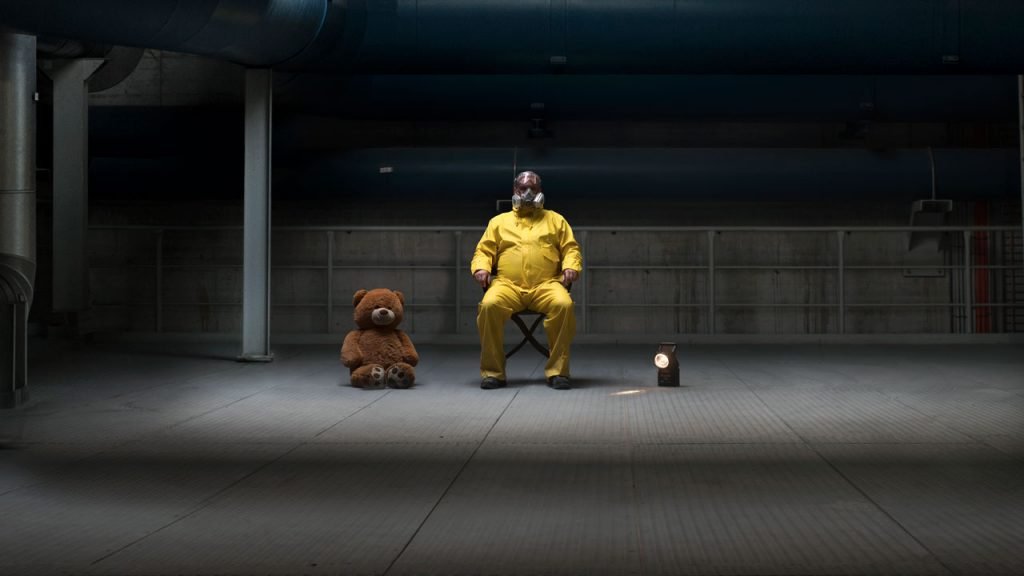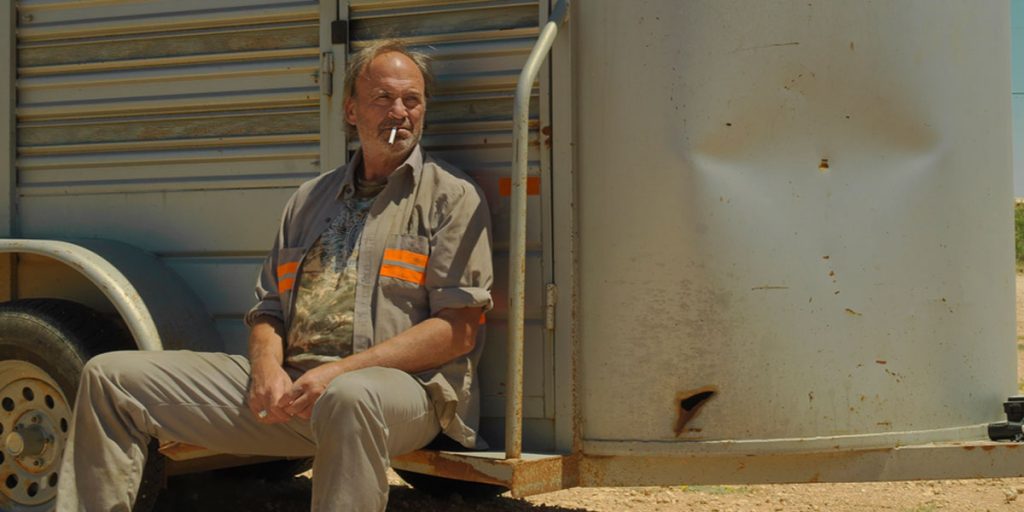Beautiful Things crafts a transcendent narrative of the material lifecycle and the solitude of the lives behind industrial processes, in dazzling experimental cinematic form.
“We still have to live in this world, even though everything may seem like a big chaos,” says a growly, mechanical voice in German with a vocal and philosophical timbre reminiscent of Werner Herzog. The camera geometrically hovers across the infernal landscape of a waste-to-energy plant and an electronic score beeps with menacing synth pulses, crafting an oppressive, overwhelming atmosphere of material death. “I make things disappear, things that people no longer want”, the voice tells us, a man dressed in a florescent yellow protective suit and mask, sitting on a chair between a giant teddy bear and a flashlight. Welcome to the threshold to the afterlife, where “stuff” leaves its material form and enters a new existence—the artifice of our consumer world, too, partakes in a spiritual experience of life.
Directed by composer Giorgio Ferrero, Beautiful Things is a visual meditation on the lifecycle of “stuff”, witnessed through images of industrial spaces and the slow solitude of the lives of workers who participate in the birth, life, movement, and death of material products. Despite the epic scope it poses, the film is microscopic and minute, focused on the processes and forgotten people we give little, if any thought to. Petroleum Man (Van Quattro) guides us through the desolate oil fields in the Permian Basin in Texas, where the humdrum stillness of the flatland is interrupted by the mechanical rhythm of oil pump jacks that thrust into the ground nearly as deep as the height of Mount Everest.
Cargo Man (Danilo Tribunal) takes us aboard a cargo ship longer than the Empire State Building, occupied by a crew of 25, and reflects on a lonely life at sea. An ominous shot of a spinning laundry machine takes us to an anechoic chamber, where, under the danger of a “loss of physical and psychological equilibrium”, Measure Man (Andrea Pavoni Belli) measures the acoustic validation of products like cars and computers. Finally, we meet Ashes Man (Vito Mirizzi), who takes us inside the dreary conditions of a waste plant in Switzerland, a new life after spending fifteen years gambling and the realization that “I made a lot of money, but God didn’t want me to earn so much.”

Beautiful Things is a stunning piece of cinematic experimentation, a multimedia project that is part documentary, music video, and dance performance. Comparisons can be drawn with the contemplative voiceovers of Terrence Malick, industrial landscape photography of Edward Burtynsky, and non-narrative documentary form of Godfrey Reggio and Ron Fricke, but this film still remains profoundly unique and innovative. Ferrero weaves together the four central segments with motifs of sounds and silence, briefly overlapping into another’s world, at times, to suggest the interconnectivity of life even in material products, and they all culminate in a hypnotic musical sequence featuring metal percussion, a violin, and haunting human vocals. Interludes appear in between the four segments, with scenes of a couple that owns the stuff we see created and destroyed, oblivious to the industrial processes that exist outside of the consumer cycle.
At times, the film feels a little disjointed, especially with multiple tonal shifts, and the uneven rhythm of the Petroleum Man segment lacks the visual energy of the later segments. However, after a slow opening, the film picks up a kinetic pace and newfound sense of style for the remainder of the 96-minute runtime, completely entrancing and riveting in its avant-garde aesthetic vision, where the camera dances with ethereal motions, framing the tangible facts of our lives through an otherworldly visual experience. Beautiful Things is difficult to enter and engage with, a dizzying cinematic trip oscillating between sound and silence, birth and death, stillness and motion, solitude and chaos, and materiality and spirituality. We would never imagine a spiritual and existential dimension to consumerist culture, and it’s a challenging journey that forces a new perspective in front of our eyes. Yet it is a necessary film to watch, a requiem to the silent, unheard voices of the human lives behind the mechanisms of our modern industrial world and their unique guiding philosophies.
Beautiful Things premiered at the Venice Film Festival in September 2019 and was screened on YouTube on 3rd June as part of the We Are One Film Festival.

